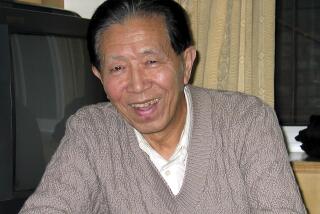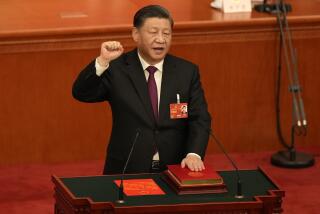China’s Leader Campaigning for Cult Status
- Share via
BEIJING — It’s hard to create a cult of personality when so many people think you don’t have one.
That’s the tough lesson China’s No. 1 leader, President Jiang Zemin, has learned, despite a media offensive by his handlers that would put many U.S. politicians to shame.
He kisses babies, sings at state banquets and hires pollsters to tell him how he’s doing. His face is plastered on billboards and book covers. Like his two iconic predecessors, Mao Tse-tung and Deng Xiaoping, he goes swimming for the cameras to demonstrate his vigor.
But to many Chinese, Jiang, 76, still cuts a colorless figure.
“Jiang Zemin is like an old lady,” one veteran Communist Party member in Beijing said disdainfully.
By all accounts, the bespectacled, bookish-looking Jiang is desperate to be elevated into the Chinese pantheon alongside Mao, the founder of the People’s Republic, and Deng, the mentor who plucked Jiang almost out of nowhere to be his successor.
Yet despite holding all the most important titles in China--president, party secretary and head of the military--Jiang is far less powerful than the two men before him, who ruled with absolute authority based on their status as heroes of the Communist revolution.
These days, Jiang’s leadership is under the microscope as China gears up for its 16th Communist Party Congress, a crucial political gathering held every five years and due to begin Nov. 8. All eyes are fixed on the Chinese president to see whether he will step down from his post of party chief, as widely expected, or hang on to power.
Whatever his intentions, there is no question that Jiang and his supporters have been trying for years to burnish his image through an aggressive public-relations campaign, including frequent photo ops with world leaders such as the one he will no doubt participate in with President Bush at the American leader’s Texas ranch this month.
Jiang’s concern--some call it an obsession--about his public persona is not simply a function of vanity, although those who have met him say there seems no shortage of that. It is also, analysts say, a political ploy, part of a wider effort over the last decade to strengthen his position and ensure that his influence endures even if he steps down in November.
*
New Skepticism in Air
Jiang doesn’t boast the pedigree of Mao or Deng. At the same time, 20 years of breakneck social and economic change have given rise to a better-educated, more sophisticated and more skeptical Chinese populace than ever before, open to outside influences and information--some of it highly unflattering to its unelected leaders.
Hence Jiang’s unrelenting media blitz, which aims to establish him firmly in the public’s eyes as the rightful heir to the throne.
Jiang, observers say, has spent more time and effort cultivating his image than other Chinese leaders, going so far as to discreetly hire a PR firm back in 1997 to find out how people rated his performance in presiding over Hong Kong’s return to Beijing’s control.
“I think it’s a new situation,” said Victor Yuan, the founder of an independent polling firm in Beijing that has researched popular attitudes about government. “In the U.S., politicians, at least on the face of it, say they try to please the public. Here, people are not voters; they still [can only] listen to their leaders. But those leaders are starting to think about public opinion.”
Such opinion still has extremely limited impact on a system that eschews public accountability. Power in China continues to flow mainly from back-room deals, tight political control and other undemocratic practices by the Communist Party.
But the current regime has staked its legitimacy on its ability to deliver prosperity to the nation’s 1.3 billion people and to turn China into a major player on the world stage. Popular opinion can no longer be written off, even if it’s not yet the direct key to power.
Gone are the days when Mao or Deng could remain the unquestioned ruler of China whatever the results of his policies.
Mao was revered as the Great Helmsman despite disastrous mistakes such as the Great Leap Forward of the 1950s--a collectivization program in which a staggering 30 million people died of starvation--and the anarchic 1966-76 Cultural Revolution.
Deng, too, remained “paramount leader” through and after the 1989 Tiananmen Square massacre, although he held no formal titles by the time of his death except honorary president of a charity and of China’s Bridge Assn.
Jiang is a cautious technocrat, not an inspirational revolutionary or visionary. His political credentials come from a Shanghai university and a Soviet car factory, not the legendary Long March of the 1930s, the crucible that yielded the early leaders of the People’s Republic.
He has had to rely instead on astute political maneuvering to knock off his rivals ever since Deng anointed him party chief right after the Tiananmen Square massacre.
His handlers have striven to portray Jiang as a modernizer in tune with the times, a progressive thinker who wants to broaden the Communist Party to include not just its traditional base of peasants and workers but China’s new elites: its small but increasingly influential middle class, its professionals and intellectuals, and its entrepreneurs.
Jiang’s awkwardly named and somewhat confusing political philosophy, the “Three Represents,” is widely seen as an attempt to co-opt these growing elites by inviting them to join the party.
“He tries to please everybody,” said one public-relations consultant who has advised the government and asked not to be identified. Some of Jiang’s attempts to drive home his right of succession have been embarrassingly ham-handed. One newspaper article a few years ago featured photos of Mao and Deng reading the People’s Daily, the party mouthpiece. A third picture showed Jiang mimicking them almost down to the pose.
His emphasis on image even dictates his choice of clothes. When the country celebrated 50 years of Communist rule in 1999 with a massive parade through downtown Beijing, Jiang was the only one of China’s leaders up on the viewing platform wearing a Mao suit. The others wore Western dress and clapped stonily as marchers went by hoisting huge pictures of Mao, Deng and Jiang.
Perhaps more than any other of his duties, Jiang relishes his role as a world statesman--and plays it up as much as possible. The national evening newscast, seen by hundreds of millions of viewers, airs almost nightly footage of Jiang trotting the globe or receiving tribute in Beijing from small, poor countries that most Chinese have never heard of.
The cameras also track him on highly staged walkabouts among ordinary Chinese, whose flesh he presses and infants he dandles on his knee to show himself a beneficent leader in touch with the average Zhou.
But the results aren’t always encouraging.
*
Ridicule and Apathy
Many Chinese think Jiang looks ridiculous and sycophantic bursting into English for foreign dignitaries or indulging his habit, which he apparently thinks charming, of serenading them with snatches of Chinese opera.
Others find it hard to care even enough to poke fun at the “Three Represents,” which he is lobbying hard to have written into the Communist Party charter at the party congress. This would guarantee that his influence on China’s direction would continue.
A survey of young people found that only 11% could name even one of the “represents.” Scoffers say the philosophy should be enshrined in the party charter, alongside “Mao Tse-tung Thought” and “Deng Xiaoping Theory,” under the heading “Jiang Zemin’s Opinions.”
“I don’t see Jiang as a particularly popular leader,” said Joseph Fewsmith, an expert on Chinese politics at Boston University. “I think there is a real disconnect between the public, which is more interested in making a living, and the leadership, where party mechanisms and control over ideology remain important.”
But Jiang lacks the charisma of Mao. And despite the best efforts of his spin doctors, many still do not see him as path-breaking like Deng, who instituted the market-oriented reforms he continued.
“Unless he has been sure of his next move, he has generally not moved. This has given his administration a lackluster character because he is not associated with forceful or visionary leadership,” Fewsmith said. “But it has helped him stay in power.”
More to Read
Sign up for Essential California
The most important California stories and recommendations in your inbox every morning.
You may occasionally receive promotional content from the Los Angeles Times.














